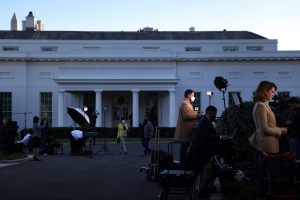
Mass communication has always played an important role in shaping public opinion and the perception of reality of society, but in recent years it has transformed into a critical controversial force.
With only a few exceptions, the US mainstream media has crowned Biden as the winner of the presidential election, while President Trump’s legal team is contesting the results with allegations of fraud. A total of 220 GOP members of the House and Senate—an overwhelming majority of Republicans in Congress—will simply not acknowledge Biden’s win before everything is cleared up, according to a Washington Post poll.
The US example, and quite frankly the prevailing tendency all over the world, shows how the biased media is not carrying out its role to objectively report on current events as it is supposed to do. The free world should be characterized by a robust independent media that acts as a watchdog of the people’s interests, instead of being a mouthpiece for a specific sector with a particular financial or political agenda. Otherwise, we lose any semblance of democracy, which by definition is the rule of the people, where all voices are equal and have the right to be heard and taken into account.
When the media distorts its role and becomes a ruler, censoring ideas or speeches of public officials that do not correspond to their own views, democracy cannot exist either. Limiting pluralism diverts people from deep thought, discussion, and understanding. Instead, the populace is pumped full of low-level communication packed with gossip, lies, and one-sided information. In such a scenario, there is no search for in-depth analysis, only an attempt to advertise and profit, mislead and confuse the audience.
Beyond the political dispute about the results of the US election, what does the state of the media say about American society? It says that all the voting laws and procedures set by the states throughout the years—which leave room for people’s doubts and dissatisfaction about election results and generate dubious interpretations by special interest groups including the media—need to be carefully examined and updated to the new world’s reality, as some analysts propose. This is not only true in America but also in the rest of humanity which is starting to understand that there is a need for a serious change of direction from old structures and frameworks.
It may not be clearly apparent and obvious in daily life but this development in needs is a consequence of humanity’s evolution. The forces inherent in nature are obliging the whole world to fix the distortions revealed before our eyes. If we see society in a state of separation and confusion, it should make efforts to recover balance through connection.
It is the media that sets the general public tone and atmosphere. As public discourse stands now, one point of view is raised and another lowered. Therefore, a renewed media that will serve the people’s interest must strive to establish a common, middle ground that will connect and balance the pluses and minuses, pros and cons—guaranteeing everyone a voice for pluralistic opinion. A healthy media can illuminate society by becoming a connecting force for everyone’s benefit and progress.
Posted on LinkedIn, Medium, KabNet, The Times of Israel, Facebook